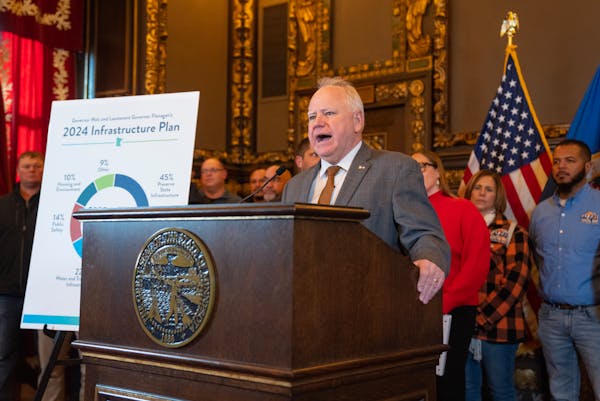Rules governing how much parking that cities require for businesses and multifamily dwellings such as apartment buildings are capricious and arbitrary, says Sen. Omar Fateh, DFL-Minneapolis.
He point to rules in Carver, Minn., that require a minimum of two parking stalls for each lane in a bowling alley, while in Anoka the requirement is seven.
"Are bowlers driving 3½ times as much in Anoka than in Carver?" Fateh asked rhetorically during a news conference last week to unveil the People Over Parking Act that he plans to introduce at the Legislature this year. "Mandates force people to build more parking than they need, and they are burdensome for renters."
Fateh's bill would not eliminate any existing parking, but it would create a statewide law giving developers, business owners and landlords the ability to decide for themselves how much parking they need or want for new construction or existing buildings are renovated.
Efforts to reduce excessive parking have been gaining momentum following the decision by Minneapolis in 2015 to become the first city in the nation to get rid of a mandate requiring a minimum number of parking spots at transit stations. At that time, Chris Meyer, who sits on the Minneapolis Planning Commission, gave each member of the Minneapolis City Council a copy of the book "The High Cost of Free Parking." The tactic worked, Meyer said, and it led to the city scrapping the mandate.
In the years since, Minneapolis, St. Paul, Duluth and about 50 other cities across the country have eliminated minimum citywide parking mandates, said Tony Jordan with the Parking Reform Network.
"It has become a true national movement," said Meyer, who bought 130 copies of the urban planning book to give to lawmakers in hopes of gaining support for Fateh's bill.
Fateh has yet to find an author in the state House to champion the bill but has support from Democratic U.S. Rep. Ilhan Omar, who represents Minnesota's 5th District. Omar is co-sponsoring a national version of the bill in Congress.
Omar said Fateh's bill is necessary because large parking lots lead to higher rents, she said. It can cost as much as $40,000 per parking spot. The cost ultimately gets passed on to tenants, including those who don't own a car. Ditching city-imposed parking requirements would let developers build more units on the same plot of land, allowing more people to secure affordable housing, she said.
"If we make every apartment complex $40,000 cheaper to build, it will be much cheaper to rent that apartment," Omar said.
The Coalition of Greater Minnesota Cities, an advocacy group representing cities outside the metro area, is not on board.
"Cities already have the authority to eliminate parking minimums if they choose," said Executive Director Bradley Peterson. "This proposal is premised on the idea that what is good for Minneapolis is automatically good for Mountain Lake, Moorhead, or Mahnomen."
Fateh said his bill will address two vexing crises of the time, climate change and affordable housing.
"Minimum parking mandates are terrible for both," he said. "We need our policies to focus on building housing for people, not more housing for cars."
This story has been updated to reflect the true cost of building a parking spot rather than a parking lot.

Want to share info with the Star Tribune? How to do it securely

'Safe recovery sites' would offer syringes, naloxone and more to people using drugs. The plan could be in peril.
New Minnesota GOP leaders seek peace with party's anti-establishment wing

Who is Republican Lisa Demuth, Minnesota's first House speaker of color?

